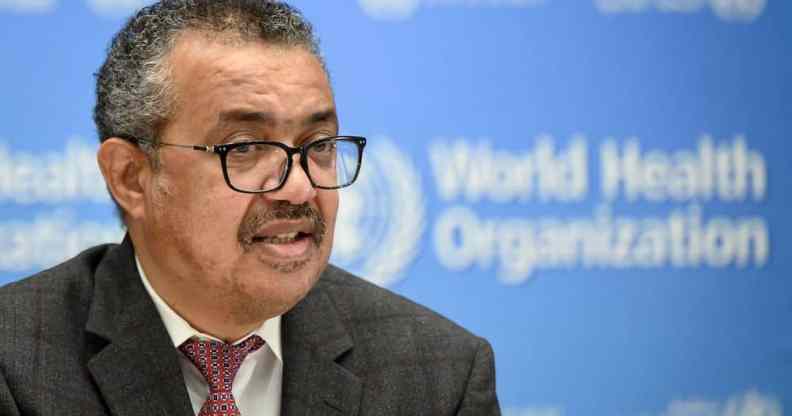Monkeypox: World Health Organization suggests queer men ‘reduce number of sexual partners’

WHO director general Tedros Adhanom Ghebreyesus. (AFP via Getty/ FABRICE COFFRINI)
The World Health Organization (WHO) has suggested that gay and bisexual men should reduce their number of sexual partners to limit the spread of monkeypox.
WHO director general Tedros Adhanom Ghebreyesus confirmed on Wednesday (27 July) that there have been more than 18,000 recorded cases of monkeypox outside of countries where the virus is endemic, with more than 70 per cent of these found in Europe.
However, the disease is usually mild, and just five deaths have been reported.
While the outbreak continues to grow, Ghebreyesus said at the briefing that it could yet be stopped. He called on countries around the world to “take the risk seriously” and “take the steps needed to stop transmission”.
He continued: “For men who have sex with men, this includes for the moment, reducing your number of sexual partners, reconsidering considering sex with new partners, and exchanging contact details with any new partners to enable follow up if needed.
“The focus for all countries must be engaging and empowering communities of men who have sex with men to reduce the risk of infection and onward transmission, to provide care for those infected, and to safeguard human rights and dignity.”
However, Ghebreyesus made clear that “stigma and discrimination can be as dangerous as any virus, and can fuel the outbreak”.
He added: “As we have seen with COVID-19, misinformation and disinformation can spread rapidly online, so we call on social media platforms, tech companies and news organisations to work with us to prevent and counter harmful information.”
Ghebreyesus emphasised that although 98 per cent of cases have been among men who have sex with men, “anyone exposed can get monkeypox”.
Addressing vaccination programmes, the WHO director admitted that there were global issues with supplies of smallpox vaccines, which can also be used to vaccinate against monkeypox.
He said that the WHO was in touch with various countries to “understand their supply needs”, and added: “WHO urges countries with smallpox vaccines to share them with countries that don’t.
“We must ensure equitable access to vaccines for all individuals and communities affected by monkeypox, in all countries, in all regions.
“While vaccines will be an important tool, surveillance, diagnosis and risk reduction remain central to preventing transmission and stopping this outbreak.”
On Monday (25 July), Mateo Prochazka, an infectious disease epidemiologist with the UK Health Security Agency, told PinkNews that UK officials aren’t interested in “policing” people’s sexual behaviour.
He said that any changes to behaviour – such as people in open relationships closing them temporarily – are “completely personal decisions”.
“But in my opinion it’s a sensible one,” he added. “This doesn’t have to be a permanent change but it could be a short change while we wait for the vaccine to kick in at the population effect and to make sure that we’re protected as a community. Then again, it’s always going to be a personal choice.”
On Saturday (23 July), the WHO declared the escalating monkeypox outbreak a global health emergency.

